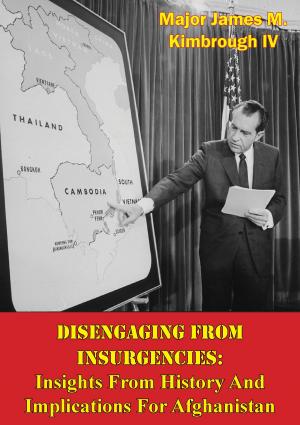Mind Games: Setting Conditions for Successful Counterinsurgency Military Information Support Operations
Nonfiction, History, Middle East, Persian Gulf War, Military| Author: | Major Henry B. Davis IV | ISBN: | 9781782899716 |
| Publisher: | Tannenberg Publishing | Publication: | November 6, 2015 |
| Imprint: | Tannenberg Publishing | Language: | English |
| Author: | Major Henry B. Davis IV |
| ISBN: | 9781782899716 |
| Publisher: | Tannenberg Publishing |
| Publication: | November 6, 2015 |
| Imprint: | Tannenberg Publishing |
| Language: | English |
The purpose of this study is to determine what actions can be taken by American military forces to set conditions for conducting effective Military Information Support Operations (MISO) campaigns in counterinsurgency (COIN) conflicts. To find these actions, hypotheses built upon tenets found in American military Psychological Operations (PSYOP) doctrine were compared to empirical observations of PSYOP conducted in three COIN case studies from the 1950s and 1960s. Because COIN literature is ripe with assertions, such as Dr. Kalev I. Sepp’s, that “effective, pervasive psychological operations (PSYOP) campaigns” are inherent in successful COIN operations, it is ironic that few works discuss specific recommendations regarding the design and conduct of such campaigns. This study begins filling this literature gap by showing that MISO relationship to other operations holds greater significance in effective MISO campaign design than internal details such as the level of centralization. This finding supports contemporary calls for a more unified group of inform and influence practitioners within the United States military, as well as calls for the United States government to draft a National Information Strategy to better leverage this important element of national power.
The purpose of this study is to determine what actions can be taken by American military forces to set conditions for conducting effective Military Information Support Operations (MISO) campaigns in counterinsurgency (COIN) conflicts. To find these actions, hypotheses built upon tenets found in American military Psychological Operations (PSYOP) doctrine were compared to empirical observations of PSYOP conducted in three COIN case studies from the 1950s and 1960s. Because COIN literature is ripe with assertions, such as Dr. Kalev I. Sepp’s, that “effective, pervasive psychological operations (PSYOP) campaigns” are inherent in successful COIN operations, it is ironic that few works discuss specific recommendations regarding the design and conduct of such campaigns. This study begins filling this literature gap by showing that MISO relationship to other operations holds greater significance in effective MISO campaign design than internal details such as the level of centralization. This finding supports contemporary calls for a more unified group of inform and influence practitioners within the United States military, as well as calls for the United States government to draft a National Information Strategy to better leverage this important element of national power.


![Cover of the book Scouts Out! The Development Of Reconnaissance Units In Modern Armies [Illustrated Edition] by Major Henry B. Davis IV](https://www.kuoky.com/images/2014/august/300x300/9781782899129-W8Ew_300x.jpg)


![Cover of the book The Bear Went Over The Mountain: Soviet Combat Tactics In Afghanistan [Illustrated Edition] by Major Henry B. Davis IV](https://www.kuoky.com/images/2014/august/300x300/9781782895817-8SXU_300x.jpg)

![Cover of the book General Leemy’s Circus: A Navigator’s Story Of The Twentieth Air Force In World War II [Illustrated Edition] by Major Henry B. Davis IV](https://www.kuoky.com/images/2015/november/300x300/9781786253330-G0nj_300x.jpg)
![Cover of the book Vanguard Of Valor : Small Unit Actions In Afghanistan Vol. II [Illustrated Edition] by Major Henry B. Davis IV](https://www.kuoky.com/images/2014/august/300x300/9781782894964-xwTe_300x.jpg)



![Cover of the book The High Road To Tokyo Bay — The AAF In The Asiatic-Pacific Theater [Illustrated Edition] by Major Henry B. Davis IV](https://www.kuoky.com/images/2014/august/300x300/9781782898917-2fPd_300x.jpg)
![Cover of the book Block By Block: The Challenges Of Urban Operations [Illustrated Edition] by Major Henry B. Davis IV](https://www.kuoky.com/images/2014/august/300x300/9781782897781-zM5J_300x.jpg)

